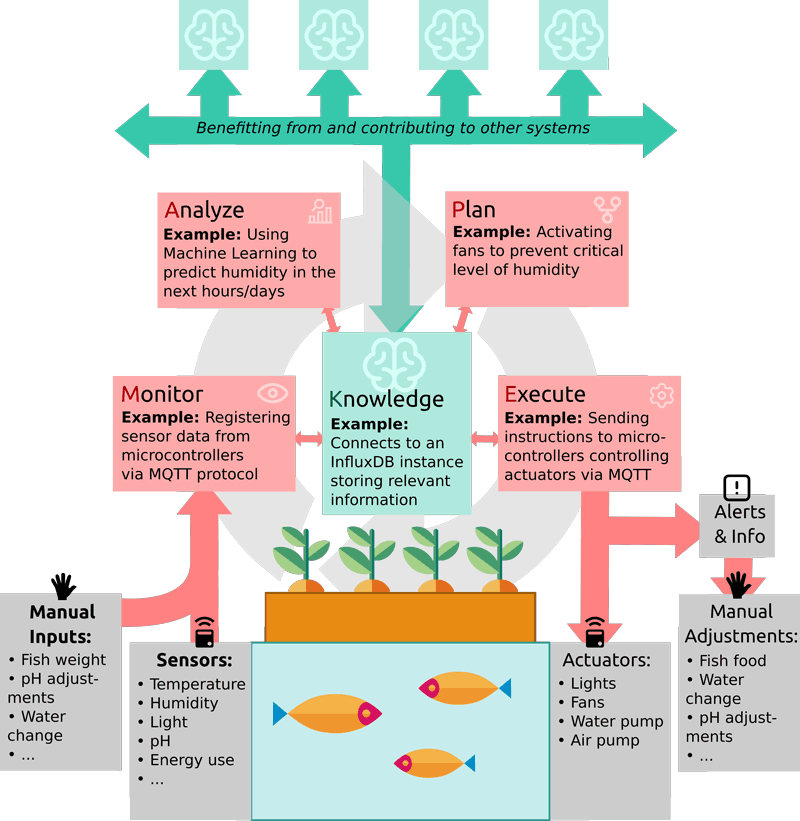by Rafael Kupsa, Amin Anjomshoaa and Markus Tauber (Research Studios Austria)
The EDEN project is at the forefront of sustainable agriculture, integrating Industry 5.0 technologies to improve upon aquaponics systems. This article explores how the project is developing innovative frameworks to maximise resource efficiency, optimise food production, and foster community engagement securely.
Aquaponics is a closed-loop system where the waste produced by fish is used as nutrients for plants, which in turn purify the water for the fish. This symbiotic relationship drastically reduces the need for water and land compared to traditional agriculture. EDEN is a two-and-a-half-year research project that began in April 2023, in collaboration with Research Studios Austria FG, the University of Applied Sciences St. Pölten, the Austrian Institute of Technology, BEIA International, and Andersfarm, an Austrian aquaponic expert, with the goal of enhancing aquaponics systems in two major steps: First, by creating hardware and software capable of intelligently optimising aquaponics systems using autonomous control loops, the Internet of Things (IoT), and machine learning (ML) technology, and second, by providing a secure platform for connecting multiple systems, allowing them to benefit from each other without compromising their data, if they so choose. As the project progresses, it holds the potential to transform aquaponics into a scalable and economically viable solution for food production, contributing to global efforts to address the challenges of food security and sustainability.
Smart Optimisation in Aquaponics
Initially, the focus is on developing a software framework that integrates IoT and ML technologies within an autonomic control loop. This framework utilises the MAPE-K (Monitor, Analyse, Plan, Execute, Knowledge) loop, a well-established approach in autonomic computing that enables systems to self-manage by continuously monitoring their environment, analysing data, planning actions, executing them, and updating their knowledge base. This continuous cycle ensures that the system can adapt to changing conditions in real-time [1,2].
In the context of aquaponics, IoT sensors collect critical data such as water quality, temperature, and humidity. The data is then processed and analysed by ML algorithms, which can detect anomalies or predict potential issues. When irregularities are detected, the system can alert users about them and, in some cases, automatically initiate corrective actions via IoT actuators. Thus, the system can be helpful in optimising key parameters such as water quality, nutrient levels, and environmental conditions in aquaponics systems (see Figure 1).

Figure 1: MAPE-K framework architecture for smart control of an aquaponics system.
One practical example of adaptive control within the EDEN project’s aquaponics system is the regulation of pH levels. IoT sensors continuously monitor pH levels, while ML algorithms predict deviations from the optimal range. When an issue is detected, the system can alert the user of it and, depending on the setup, automatically adjusts the water’s pH by adding necessary solutions with a pump, maintaining a healthy environment for both fish and plants. This automation reduces manual intervention, ensuring a more efficient and sustainable operation.
Networked Systems for Community Benefit
Beyond optimising individual aquaponics systems, the EDEN project seeks to create a network of interconnected systems that share data, resources, and knowledge. This networked approach aligns with the principles of Industry 5.0, which emphasise collaboration and circularity and is modelled after Anjomshoaa and Curry’s [3] maturity levels of knowledge sharing and reuse in smart environments. Users will be able to connect via the project’s website [L1], currently under development, at three levels:
- Data level: The first level of community engagement involves data sharing among aquaponics operators. Users can upload data from their systems to a central platform, where it can be accessed by others. This collective data pool provides valuable insights and enables operators to learn from each other’s experiences.
- Stream level: At a more advanced level, the EDEN project envisions real-time data streaming, where aquaponics systems are continuously connected to the central platform. This allows for immediate sharing of data and fosters a collaborative environment where operators can benefit from the collective knowledge of the community.
- Service level: The EDEN project also plans to facilitate the sharing of ML models among operators. By contributing their models to a shared repository, users can improve the accuracy and applicability of their systems. This federated learning approach ensures that all participants benefit from the collective advancements in technology, without compromising the privacy or security of their individual data.
This approach allows users to decide what and how much they want to share about their systems and how to contribute to improving models and data control. For example, an operator can provide the data of their pH sensors and their manual pH regulation while others can use those to initialise an automated pH-regulation model with a pH pump. The trained model could then be provided back to the user community. This collaborative approach accelerates knowledge sharing, allowing the entire network to benefit from improved performance and resource efficiency.
As the EDEN project promotes interconnected systems and shared data, ensuring the security and privacy of the data is crucial. This can be addressed by implementing robust encryption protocols for data transmission, secure authentication methods for user access, and providing options for users to anonymise their data before sharing it. Users who do not want to share data at all due to privacy concerns can still contribute by sharing models within the federated learning approach.
Links:
[L1] https://eden.researchstudio.at
References:
[1] S. Maksuti, O. Schluga, G. Settanni, M. Tauber, and J. Delsing, “Self-adaptation applied to mqtt via a generic autonomic management framework,” in 2019 IEEE Int. Conf. on Industrial Technology (ICIT), pp. 1179–1185.
[2] S. Maksuti, M. Zsilak, M. Tauber and J. Delsing, “Security and autonomic management in system of systems,” Infocommunications Journal, vol. XIII, no. 3, pp. 66–75, Sept. 2021. doi: 10.36244/ICJ.2021.3.7
[3] A. Anjomshoaa and E. Curry, “Transfer learning in smart environments,” Machine Learning and Knowledge Extraction, vol. 3, no. 2, pp. 318–332, 2021.
Please contact:
Rafael Kupsa, Research Studios Austria Forschungsgesellschaft mbH, Austria











